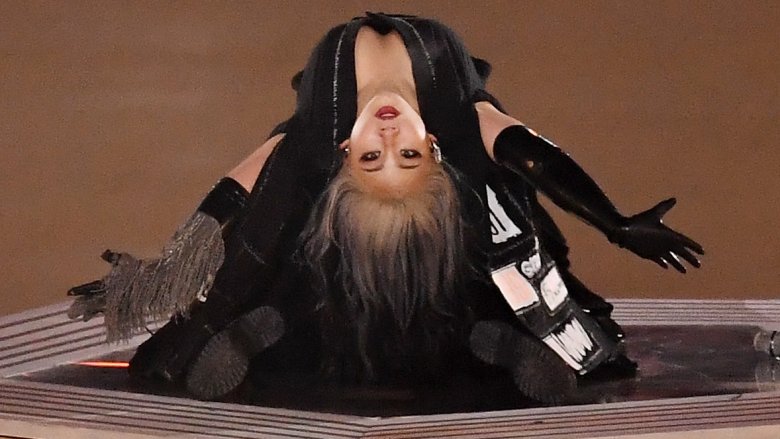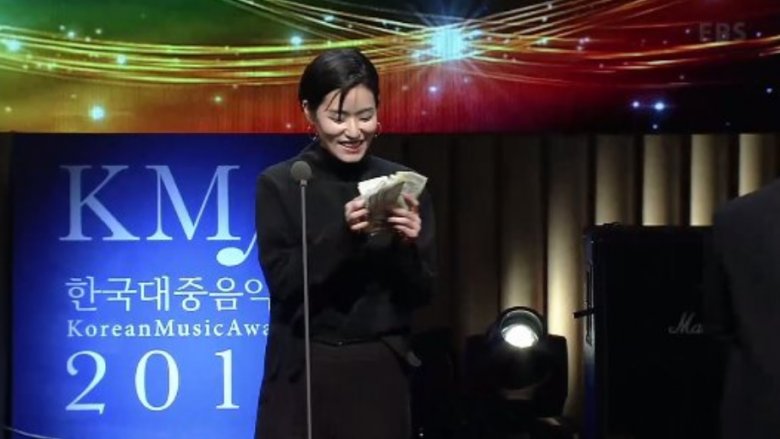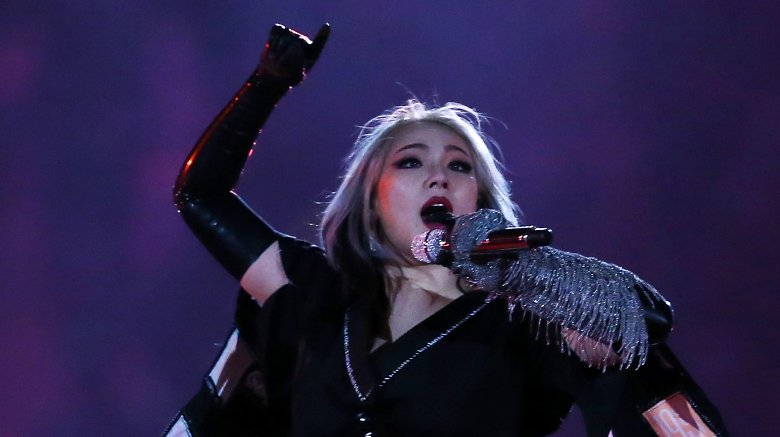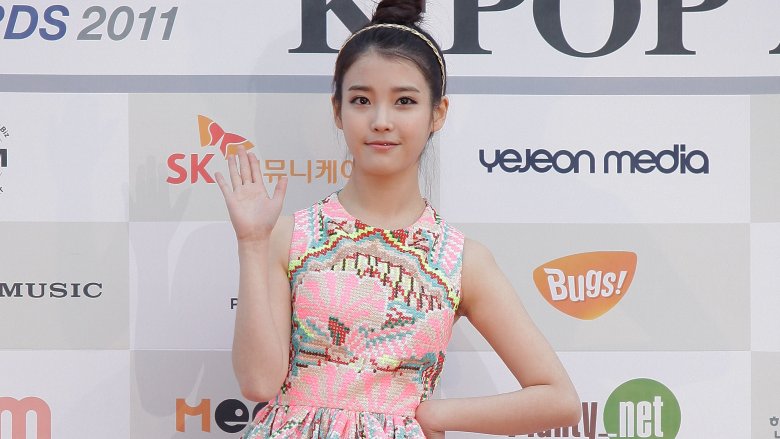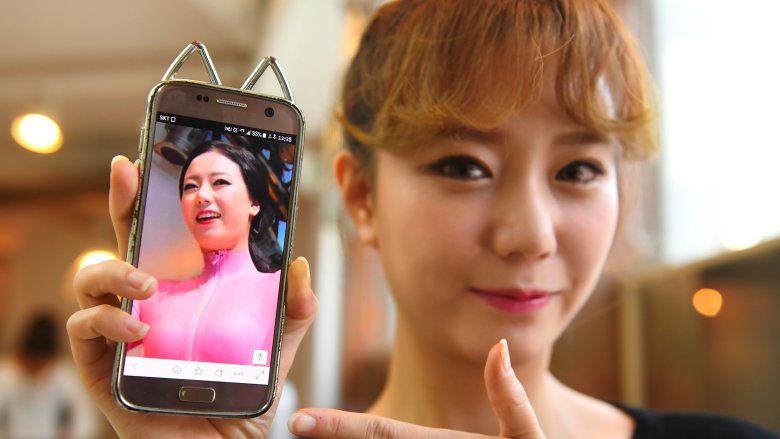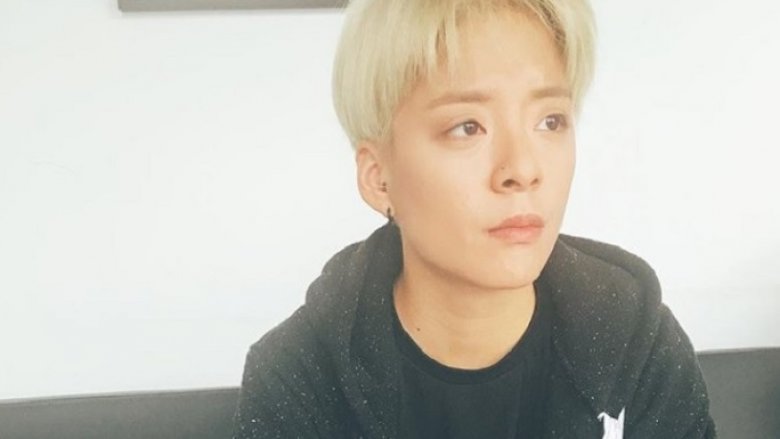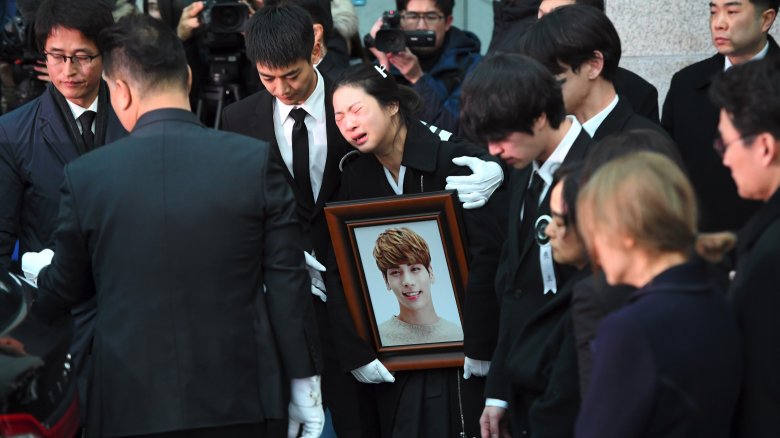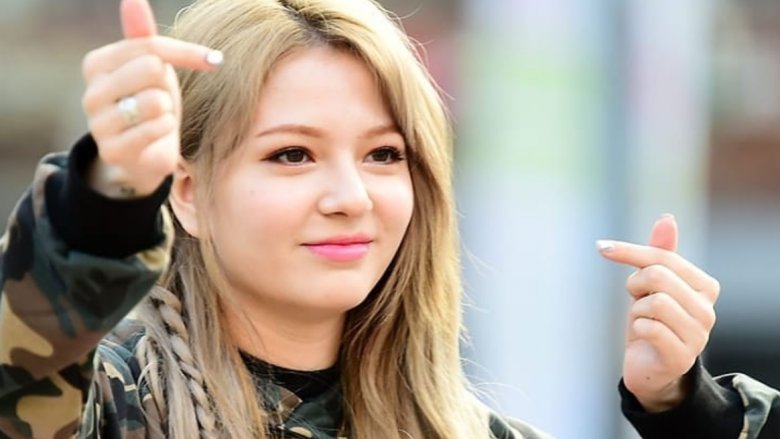K-Pop: The Disturbing Untold Truth
Is the wildly popular K-pop music wave as bright and brilliant as it looks and sounds? The truth will shock you, but first, let's take a quick look at the history of this rapidly-growing genre.
The foundations of K-pop as we know it today were laid in the late '80s, when the South Korean government loosened censorship laws in an effort to modernize, but the Korean music wave (or "Hallyu") didn't start making a splash on global shores until the 2010s, thanks in no small part to YouTube.
"It might have been impossible for K-pop to have worldwide popularity without YouTube's global platform," said Sun Lee, head of YouTube music partnerships for Korea and Greater China. "K-pop is creating a great sensation in the U.S. I don't think this is a temporary phenomenon."
According to a 2017 Bloomberg report, the worldwide K-pop industry is worth almost $5 billion. Its most popular export, boy group BTS, broke YouTube records in 2017, outperforming the likes of Lady Gaga and Drake on the platform. But this fame comes at a cost.
To make it in K-pop, idol groups have to be the total package. In addition to singing and dancing in perfect harmony, they also need to look good 24/7 and are often expected to perform in other languages. This means starting from a very young age and putting yourself at the mercy of a system that many say helps the rich get richer, while leaving the performers to struggle.
It might be all shiny and happy on the surface, but K-pop has a disturbing dark side that artists are only now starting to expose. Brace yourself as we take a closer look at the underbelly of this entertainment industry.
The slave contracts
If you're familiar with K-pop, chances are you've heard the term "slave contract." Managers profiting from the talent and hard work of their artists is by no means a strictly Korean phenomenon, but it's here that the exploitation of aspiring stars appears to be at its most blatant, according to various accounts from the idols themselves.
Former JJCC member Prince Mak claims that the notorious slave contract is not only real, it's widespread. "Slave contracts are a long time," he said on his radio show The Prince Mak Hour (via SBS). "Typical contracts are about 7 to 15 years. 7 years is the least I've heard of.... I was 7 years myself and I considered myself lucky." To make matters worse, these contracts supposedly begin when an artist debuts, not when they are initially picked up by an agency, Mak said.
Some artists have been bold enough to take their agencies to court, as B.A.P did in 2014 when the boy group openly accused TS Entertainment of imposing slave contracts. The situation seemed to be improving in 2017, when agencies were ordered to stop forcing unfair contracts on trainees by the Fair Trade Commission, but they've been warned about bad deals before. The FTC introduced something called the "model contract" in 2011 to try to counteract manipulative practices, though this appears to have been ignored at large by the talent agencies.
Boot camp can be hell
If you're lucky enough to make it through the difficult audition process and earn a contract, the next step is boot camp. When Spin's David Bevan visited the headquarters of YG Entertainment (one of the big three agencies that dominate the industry) in 2012, the music journalist was impressed with the postmodern complex, plush recording studios, boutique cafeteria, and on-site gym manned by a famous Korean fitness gurus. However, this was all in stark contrast to the building in which the company's 30-or-so boot campers were actually living at the time.
"You would never guess that this is where they live," Bevan wrote. "A squat, red-brick apartment building whose only distinguishing mark is the grimy noodle shop tucked into its ground floor."
Cramped living conditions and strict schedules aren't the only hardships that some K-pop trainees are subjected to. Ferlyn Wong, former member of female idol quintet SKarf, claimed her manager would subject her to "verbal abuse" during boot camp, telling her that she was "too opinionated" to make it in K-pop and would "never succeed in anything she does."
What do the parents of these young performers think of all this? Well, many moms and dads may be at the mercy of the agencies, too. "My manager told my mum off, saying she should have taught her daughter better and that her daughter is not living the way a proper human being should," Wong told TNP.
Artists barely see a dime
You could argue that all of this sacrifice is worth it when the reward is fame and fortune, but in truth, K-pop stars rarely get the latter. Even if you're lucky enough to be part of a group that makes it big, you'll still only ever see a tiny fraction of the money that you and your bandmates generate because the overwhelming majority of the profits allegedly goes straight into agency coffers.
According to former JJCC member Prince Mak, the highest percentage of the profits that an artist will receive is 20 percent, with the remaining 80 percent absorbed by management. Some artists even get as little as 10 percent, the ex-idol claimed on his radio show. And that's per group, Mak said, so if you're in a five-member act, you'll personally only see only 2 percent of the cash. From that 2 percent, the idol also has to repay the money the agency spent training them at boot camp.
If Mak's figures are accurate, a large number of K-pop stars are likely living hand to mouth — even some of the most famous artists. At the 2017 Korean Music Awards, singer Lee Lang (pictured above) caused a stir when she got up on stage to accept an award and immediately sold the trophy at auction to a man in the audience. "My income in January was 420,000 won ($370)," she said (via Korea Exposé). "Not just from my music sales, but the total."
Idols are worked to exhaustion
After graduating boot camp, the hours don't get any less grueling. Being a K-pop idol is a full-time job and then some, with groups reportedly expected to be on the clock all day, every day.
"You could be working 20 hours, or even a whole day," former group member Prince Mak said (via SBS). "I've worked 20 hours shifts. I was shooting a variety TV show and that went on for 20 hours, no joke. Everyday we average about three to four hours sleep, apart from that it's all training or work."
This hectic schedule was witnessed firsthand by Rolling Stone's Chris Martins, who spent time with international sensation BTS when the group arrived in the States to do the late show circuit in 2017. The group's lead rapper, RM, was exhausted when he met with Martins. RM reportedly rehearsed "with a bloody tissue in his nose — the wages of jet lag and constant hustle add up," but he simply got on with the job at hand, as he'd been trained to do.
BTS members have admitted to working as many as 15 hours in a single day. Even though things seem to be working out just fine for them, burning the candle at both ends can be a dangerous game for idols. There have been numerous instances of K-pop stars collapsing due to exhaustion, and sometimes it happens on stage. Koreaboo even compiled a list of all the times idols fainted during live performances.
Their diets are strictly controlled
South Korean society puts a lot of emphasis on physical beauty, meaning that the more attractive you are, the better your chances of making it in K-pop. For idols, this means maintaining a strict diet.
"You don't usually get to eat what you want," Prince Mak revealed. "Our diet is always controlled. I can't eat fried chicken everyday, even though I'd love to."
The former JJCC member claims that he knew of a female idol group whose members would be disciplined by their agency for not sticking to their prescribed weight. "If they went over the weight that the company sets them, they are punished," Mak said. "Could be dance, could be running, could be no eating. They usually check once a week."
If stipulations like these are indeed being imposed on K-pop stars, it's not surprising that K-pop stars go on seriously dangerous diets. The members of Nine Muses, for example, restrict their food intake to whatever they can fit in a small cup. However, this tactic seems almost sane compared to the diets that Park Bom of disbanded group 2NE1 used to follow. According to HelloKPop, the one-time idol would eat nothing but lettuce and watermelon.
Stars are at risk of eating disorders
K-pop idols' extreme diets can lead to eating disorders, according to Korean psychiatrist Kim Hwan-ki. "The media glamorizes the unrealistic bodies of a few," Kim wrote in a column (via the Korea Herald), blaming the mass media for encouraging "a strange sense of pride in being unhealthily underweight."
Artists JinE of girl group Oh My Girl and solo singer IU have both opened up about suffering from anorexia and bulimia, respectively, though neither girl has directly attributed their disorder to the their jobs.
Oh My Girl debuted in 2015 and was well on its way to success. Its single "Closer" was named to Billboard's top 20 K-pop songs that year. However, that same year, it was revealed that JinE had anorexia, and after a hiatus, she left the group in 2017, choosing to return to an "ordinary life" away from the K-pop vacuum. "I dreamed of becoming a singer for a long time, so I really wanted to do well, but I had physical and psychological difficulties," she said in a letter to fans (via Koreaboo).
IU chose to discuss her own troubles on an episode of celebrity talk show Healing Camp, revealing that she had to receive treatment for bulimia. "My heart felt empty, and I tried to fill the void with food," she said (via SBS). "However, instead of feeling better, I became anxious and felt like I was lacking. I would eat until I threw up."
Plastic surgery pressures
Seoul is the plastic surgery capital of the world, a place where as many as one in three women have undergone a procedure, according to The New Yorker. Surgery is reportedly rife in K-pop, and artists will often allude to its prevalence in their music, whether that be to subtly poke fun at it (like Psy's "New Face") or brazenly embrace it (like Six Bomb's "Becoming Prettier.") It's not uncommon for idols to discuss their enhancements during interviews, but what doesn't happen very often is an idol admitting that they were pushed into it.
"One day, the president of our agency suggested I should have double eyelid surgery because I have an unpleasant look in my eyes, so I decided to follow his suggestion," said Shindong from boy group Super Junior (via MIJ). While Shindong is not someone known for holding his tongue (he caused quite the stir in a radio interview when he said it was okay for men to be overweight but not women,) his allegation that his agency straight-up told him to go under the knife was shocking.
Solo artist Hwang Chi Yeul has also admitted to getting work done at the request of his management. "I actually had a nose that curved down," the ballad singer and TV host said (via Soompi). "I didn't really have thoughts of plastic surgery, but before debut my management company said that we should do it, so I agreed."
Sexual exploitation may be commonplace
The South Korean entertainment industry has been built on a system of "sponsorship," which is basically another word for prostitution, according to SeoulBeats. "Sponsorship is the dirty, barely kept secret of the Korean entertainment industry," the Hallyu website claims. "Every entertainment industry has some form of the casting couch, yes, but there are few that come close to the systematic way that it is present in South Korea."
Traditionally, idols don't go public about abuse, preferring to share their stories anonymously in order to protect their careers. In 2014, a number of male ex-trainees came forward to blow the lid on their agency's alleged history of sexual exploitation, but they refused to be identified. The same thing happened in 2017, when someone claiming to be an underage female idol posted a harrowing account of her group's experience with "sponsorship" online, but she didn't share any names.
Could 2018 be the year that changes? The #MeToo movement has begun to take root in South Korea, and more artists are beginning to speak up. In a social media post, Los Angeles-born idol Amber of girl group F(X) said that sexual abuse "happens everywhere" in her industry. "Not only from what I have experienced but also from what I have seen my friends and loved ones have to go through," she said (via Billboard). "And because it's so common, I hate to say it ... the feelings become so numb and we all felt that we just had to 'deal with it.'"
The suicide problem
Kim Jong-hyun (known professionally as Jonghyun), the frontman of popular K-pop act SHINee, took his own life in December 2017. In an apparent suicide note shared by a friend, the artist spoke about the intense pressures of life as a music idol.
"If you ask why people die, they would probably say it's because they're exhausted," Jonghyun said in his note, which was posted to Instagram by friend and fellow idol Nine9. "I suffered and agonized about it [but] I never learned how to turn this pain into happiness," the note said, adding that the young star felt he was "not meant to lead a life in the public eye."
Sadly, Jonghyun wasn't the first idol to succumb to the pressure. According to Kim Young-ha, author of I Have the Right to Destroy Myself, suicides spiked in South Korea after the 1997 Asian financial crisis and have been rising ever since. "Suicide is everywhere," he said in a 2014 piece for The New York Times. "Now, whenever I hear news that a young person has passed away, suicide is the first possibility that comes to mind."
The intense media vacuum that K-pop stars get sucked into may put them at an increased risk for suicide. In 2007, solo artist U;Nee hanged herself in her home just before the release of her third album. In 2010, singer Choi Jin-young took his own life just 18 months after the suicide of his actress sister Choi Jin-shil. In 2015, Ahn Sojin was found unresponsive after being dropped by her agency.
Fans can be seriously dangerous
Most idols use social media to interact with their fans around the clock. When they leave the safety of private property, however, those interactions can quickly become dangerous.
Some fans simply freak out upon meeting their idols (like this 2PM ultra fan girl), but there's a certain type of superfan that every idol fears. A "sasaeng" is a fan whose obsession with their chosen idol has reached levels bordering on insanity, and there are no shortage of bizarre accounts about such fans.
Idols are used to being tailed by crazed fans when they're on the road. Fans not old enough to drive can simply catch a cab — renting out a sasaeng taxi for the day costs a cool $300, according to AllKPop. Members of Big Bang and Super Junior have been involved in multi-car pile ups as a result of being chased by fans. Heechul from Super Junior even closed his Twitter account as a result. "Please do not follow me to my house or to my ward office," he said. "I still feel the after effects of my accident, and it's frightening to put my life on the line and drive away as if I'm running from something."
If you're not safe on the roads, you're at least safe when you're performing, right? Wrong. SNSD's Taeyeon found this out the hard way when a strange man got onstage during a live performance and tried to abduct her in front of everyone.
Are foreigners discriminated against?
With training centers popping up everywhere, from Sydney to New York City, the ever-ambitious K-pop industry has flung its doors open to foreign talent. Many idols speak multiple languages and are often required to perform in different languages, with Japan proving a particularly lucrative market. This means that foreigners entering the industry need to brush up on their language skills fast, especially when it comes to Korean.
"As a foreigner in Korea, it was actually quite hard," Chinese-Australian artist Prince Mak said. "Korea is actually very foreign friendly, but in the industry, it's not very foreign friendly. They won't forgive you for not speaking good Korean. They think if you're working in Korea, if you're in the K-pop industry, you have to speak good Korean." Mak isn't the only mixed-race idol to experience difficulties. Some artists claim they've been racially discriminated against.
British-Korean singer Shannon was trolled after she performed the Korean national anthem at a baseball game. "My mother is Korean, and it shouldn't matter, because I have Korean blood in me," she said (via SBS). "But they kept calling me a foreigner. They wrote negative comments about me."
Chinese native Fei, of girl group Miss A, had a similar experience with haters. "When I first came to Korea, someone asked me if I only take a shower once a week. I was taken aback," she recalled (via AllKPop.) "I said, 'I shower everyday. Why? Do you think Chinese people don't take showers?' The person seriously thought that. I was surprised."

